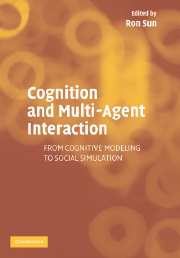Book contents
- Frontmatter
- Contents
- List of Contributors
- Preface
- PART 1 INTRODUCTION
- PART 2 OVERVIEWS OF COGNITIVE ARCHITECTURES
- PART 3 MODELING AND SIMULATING COGNITIVE AND SOCIAL PROCESSES
- PART 4 A SYMPOSIUM
- 15 Cognitive Science and Good Social Science
- 16 Collective Cognition and Emergence in Multi-Agent Systems
- 17 Social Judgment in Multi-Agent Systems
- 18 Including Human Variability in a Cognitive Architecture to Improve Team Simulation
- 19 When Does Social Simulation Need Cognitive Models?
- Index
15 - Cognitive Science and Good Social Science
Published online by Cambridge University Press: 15 December 2009
- Frontmatter
- Contents
- List of Contributors
- Preface
- PART 1 INTRODUCTION
- PART 2 OVERVIEWS OF COGNITIVE ARCHITECTURES
- PART 3 MODELING AND SIMULATING COGNITIVE AND SOCIAL PROCESSES
- PART 4 A SYMPOSIUM
- 15 Cognitive Science and Good Social Science
- 16 Collective Cognition and Emergence in Multi-Agent Systems
- 17 Social Judgment in Multi-Agent Systems
- 18 Including Human Variability in a Cognitive Architecture to Improve Team Simulation
- 19 When Does Social Simulation Need Cognitive Models?
- Index
Summary
INTRODUCTION
The underlying premise of this commentary is that good science and bad science are distinguished by their reliance, or lack thereof, on observation and evidence. Moreover, science that eschews observation in favour of formalisms is rife in the social sciences. The issue addressed here is whether cognitive science and agent design can contribute to a basis or a framework for good, observation-based social science (see Chapter 1).
This commentary is organised as follows: In Section 1, a justification is offered for the claim that orthodox economics as represented by the April 2004 issue of a leading journal and mainstream agent-based computing as represented by the work of leading protagonists are both bad science. Admittedly, economics is a particularly easy target because of the dominant role of a conventional modelling approach. To the extent that the economic formalisms and statistical approaches have been adopted in other social sciences, the claim that economics is bad science pertains to those areas of other social sciences where their techniques have been adopted. In Section 2, a procedure and examples are outlined for validating simulation models of social processes against both micro and macro level data. Section 3 contains a discussion of a role for cognitive science in agent and mechanism design.
ECONOMICS IS BAD SCIENCE
Whenever I want to demonstrate to non-economists that economics is bad science, I just describe the contents of the latest issue of almost any leading journal in the field. My choice this time is the April, 2004 issue of The Economic Journal - the most recent issue at the time of writing.
- Type
- Chapter
- Information
- Cognition and Multi-Agent InteractionFrom Cognitive Modeling to Social Simulation, pp. 393 - 400Publisher: Cambridge University PressPrint publication year: 2005



